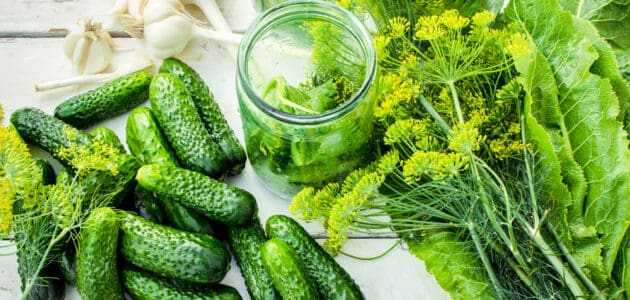Can Dogs Eat Pickles? Are They Safe or Unsafe?

You love your dog so much that you’re willing to give her everything – but that doesn’t mean you should. There are many foods that people can eat that can hurt your dog’s stomach, or worse, it can make them severely sick.
What about pickles? Maybe you’re picky, and you throw them to the dog in disgust, or maybe you want to share your favorite snack with your best friend. A few slices may not hurt, but you shouldn’t let them get carried away, and you need to be mindful of what ingredients are included. Don’t give your dog a lick of pickle juice, though – that could make them sick.
We’ll explore what makes pickles dangerous for dogs, as well as what you should do if you think your furry best friend has eaten pickles.
Cucumbers vs. Pickles
Cucumbers themselves are great treats to give to your dog. They’re high in nutrients, low in calories, and most dogs love to crunch on them since they’re cool and high in water content. People food should only be about 10% of a dog’s diet, so you still don’t want your dog to eat cucumbers all day.
However, pickles should be avoided. The pickling process is what makes pickles unhealthy for dogs to eat. Several ingredients are used to turn cucumbers into pickles, and depending on what they are, they can be dangerous for dogs to eat.
What Ingredients Are in Pickles?
These are the most common pickling ingredients:
- Vinegar
- Dill
- Onion
- Garlic
- Salt
- Sugar
Other ingredients include:
- Apple cider vinegar
- Red pepper flakes
- Black pepper
- Bay leaf
- Brown sugar
- Turmeric
- Celery seeds
- Mustard seeds
Depending on the flavor, all sorts of ingredients can be thrown into the mason jar to infuse the cucumbers with flavor. This can be dangerous because unless the ingredient list is in front of you, you might not know what’s in it.
Pickling Ingredients That Are Bad for Dogs
These ingredients can turn a tasty treat into a toxic one for dogs:
Onions, Garlic, and Chives
If these foods are eaten in large amounts, they can cause your pet to have low blood sugar, lethargy, bad breath, and elevated heart and respiratory rates. Onion and garlic powder are sometimes in dog food, but it isn’t enough to cause danger to their health.
Vinegar
If your dog has a sensitive stomach or has health issues, they may have an upset stomach after consuming vinegar, which can result in vomiting or diarrhea. Not every dog responds this way, so you’ll have to know how your dog reacts to certain types of foods.
Black Pepper
Similar to vinegar, black pepper can cause stomach problems in some dogs. It can also cause uncontrollable sneezing if they sniff it up.
Salt
Too much salt can cause your dog to suffer from sodium ion poisoning, which can result in tremors, fever, vomiting, depression, and seizures. In severe cases, it can be lethal.
How Much Is Too Much?
As a general rule of thumb, if the ingredient list is safe, a few bites are okay. If you’re unsure of what ingredients were used, don’t give your dog any. If your vet approves, and you do give your dog a treat of safe pickles, make sure to cut it into small bites, so your dog doesn’t choke.
Never let your dog have pickle juice since that’s what contains most of the dangerous ingredients. The brine is predominantly vinegar and salt, which are two things that aren’t recommended for dogs, and it could contain several ingredients that aren’t good for your pet.
It can be difficult to know when your pup has had too much of one thing. For instance, salt is okay in small amounts. Too much will cause problems, however. If you give your dog a few pickle slices that contain salt and they haven’t had any other salty foods before that, then it should be okay. If your dog got into a bag of chips when you weren’t looking, they’re at risk of having high sodium levels.
You have to keep track of how much your dog eats to know when enough is enough. Make sure they don’t eat fallen table scraps or that loving family members don’t overfeed them treats throughout the day.
What to Do if Fido Eats Too Much
If your dog has eaten a large number of pickles or you know the pickles contained dangerous ingredients, contact the Pet Poison Hotline. If they only had a few bites of pickles without ingredients you know to be toxic, contact a veterinarian and get their advice.If you notice your dog behaving differently, they may have had too many pickles. This could be due to an upset stomach because of vinegar or because their sodium levels are too high.
If the symptoms appear to be severe, it’s best to take them to the veterinarian right away. In severe cases of sodium poisoning, dogs have to be monitored for up to three days to make sure their hydration and electrolytes are under control.
Remember, this usually happens when your pet has had too much to eat. In most cases, a slice or two of a pickle isn’t enough to cause any problems, depending on what ingredients were included in the pickle’s seasoning.
Final Thoughts
If you ever have any worries about your dog’s health, or if you think they’ve ingested a large number of pickles or ones with dangerous ingredients, contact a veterinarian or poison control hotline immediately. Even safe pickles can upset some dog’s stomachs, so be sure to monitor your pet when you give them a treat.
Slipping your puppy a pickle slice or two may be okay moderation. However, it’s best to avoid it if they’ve had other table scraps or treats throughout the day, so they don’t accidentally consume too much sodium or other foods that aren’t good for them. Be mindful of what you feed your dog, and you’ll help to keep them as healthy and safe as possible.




